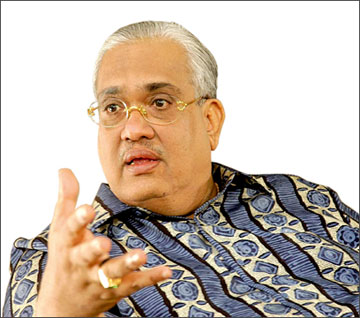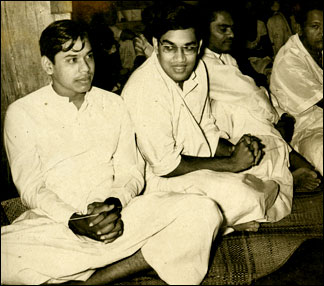The Anura phenomenon
Anura Priyadarshi Solomon Dias Bandaranaike (15. 2.
1949 - March 16. 3. 2008):
by Indeewara Thilakarathne
[email protected]
 When power and wealth accumulates, politician decay. The revised
version of the old adage sums up the common plight that befell on almost
all Sri Lankan politicians. Perhaps, Anura Priyadarshi Solomon Dias
Bandaranaike was the only exception who played his innings in the dirty
game to the rules and regulations of the civilised world. When power and wealth accumulates, politician decay. The revised
version of the old adage sums up the common plight that befell on almost
all Sri Lankan politicians. Perhaps, Anura Priyadarshi Solomon Dias
Bandaranaike was the only exception who played his innings in the dirty
game to the rules and regulations of the civilised world.
Befitting to a son of two Prime Ministers, Anura disposition within
and outside the precincts of Parliament was gentlemanly to the very
sense of the word, an undisputed fact which won him the admiration both
of his friends and foes.
It was said that when the message of Anura's birth was conveyed to
his father Prime Minister S.W.R.D Bandaranaike, he was at the foot of
Sri Maha Bodhiya. Bandaranaike named his son after the great city of
Anuradhapura.
Following his school education at Royal College where he crossed path
with many political leaders of today, including the Opposition Leader
Ranil Wickremesinghe and Dinesh Gunawardena and his higher studies in
History at University of London, Anura Bandaranaike's entry into
politics was phenomenal given his socio-economic background. Anura
Bandaranaike's role in Sri Lankan politics should be analysed against
the milieu he was born into and his family background.
The family of Bandaranaike, the foremost political dynasty maintains
close links not only with members of the Gandhi family but also with
other regional and international political leaders such as the late
Benazir Bhutto and Bill Clinton. The family produced scores of political
leaders.
|

President Mahinda Rajapaksa and Anura- close political buddies |
Anura's parents, father S.W.R.D. Bandaranaike and mother Sirimavo
Ratwatte Dias Bandaranaike were Prime Ministers while his sister
Chandrika Bandaranaike Kumaratunga was the former President.
Though Sunethra Bandaranaike's engagement with politics was short
lived, almost all the members of the dynasty were involved in active
politics in one way or another. Anura entered the political arena in
1977 on SLFP ticket from Nuwara Eliya-Maskeliya constituency when UNP
came to power with a landslide victory.
At the time, he was one of the youngest MPs in Parliament dominated
by political giants like Dr. N.M. Perera, J.R. Jayewardene and Dr.
Colvin R. de Silva. Characteristic of his father, S.W.R.D Bandaranaike,
Anura had the gift of the gap and contributed immensely to enrich the
parliamentary debate with his remarkable speeches full of wit and
information.
During his political career spanning over five decades, he served as
the Leader of the Opposition from 1983 to 1988.
After crossing over to the UNP in 1993, for a brief period Anura
served as the Minister of Higher Education. Perhaps the zenith of
political career was tenure as the Speaker of the 11th Parliament on one
occasion, as the Speaker Anura made a historic ruling where he upheld
supremacy of Parliament over the judiciary.
Anura Bandaranaike held several Ministerial positions including
Minister of Foreign Affairs, Minister of Tourism and Minister of
National Heritage.
He died on March 16, 2008 at his official residence 'Visumpaya.'
Anura Bandaranaike's death, perhaps, would be interpreted as the end of
a political dynasty which dominated the Sri Lankan political landscape
for over a half a century. Following his sister Chandrika Bandaranaike's
retirement from politics, the only member of the dynasty who showed
interest in politics was Vimukthi Kumaratunga.
Time will eventually decide on whether young Kumaratunga could fit
into his uncle's shoes. However, many factors such as socio-economic
changes would, in the long run, determine whether the days of dynastic
politics, especially in Asia is over or not.
It is a common feature in Asian and African countries that politics
is based not only on policies and principles but also on personalities
from political dynasties.
However, Anura Bandaranaike was a notable exception who did not
either exploit his social status or sacrifice his principles on the
altar of power. |
